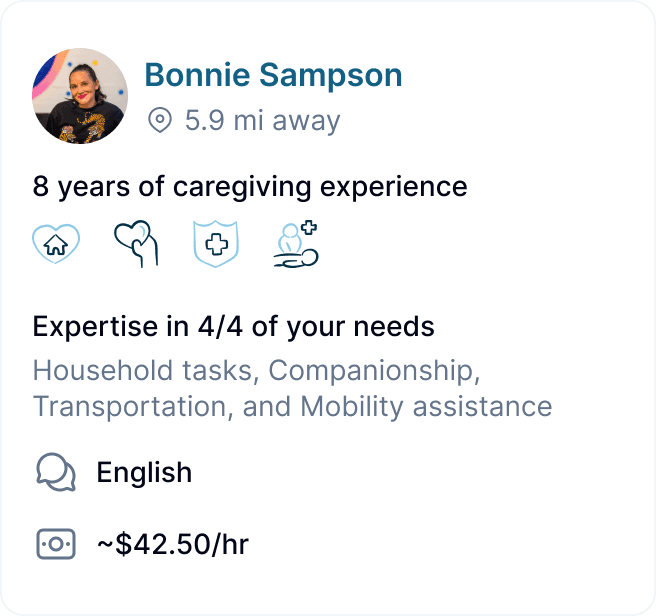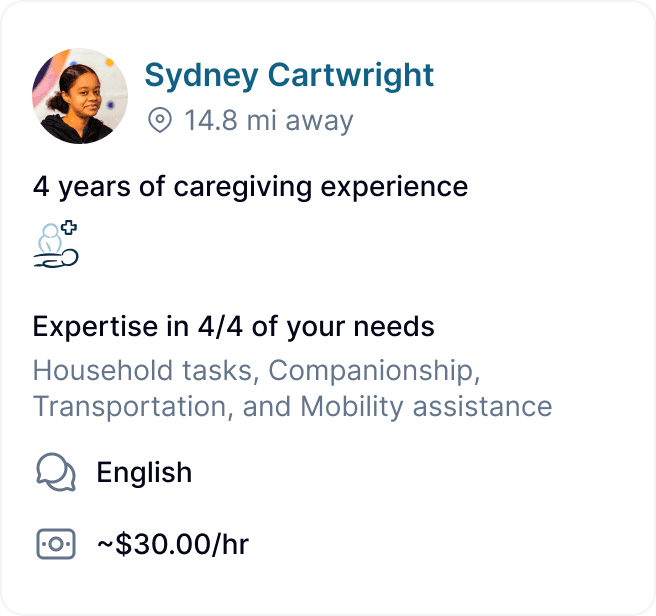When and How Many Hours Should I Hire a Caregiver?
Dec 13, 2024
Dec 13, 2024



Deciding when to hire a caregiver and determining the right number of hours can be challenging for families. The decision depends on various factors, including the level of care needed, the patient’s daily habits, and the availability of friends, neighbors, or family members to assist. This guide will help you assess your situation and make informed decisions about hiring in-home care.
Assessing Care Needs
The first step is to evaluate the specific needs of your loved one. Care needs can range from basic companionship to full-time medical assistance. Here are some common categories of care:
Personal Care: Assistance with bathing, dressing, grooming, toileting, and feeding.
Household Care: Help with cooking, cleaning, laundry, and shopping.
Emotional Support: Companionship and engagement in meaningful activities.
Health Care: Medication management, physical therapy, and transportation to medical appointments.
If your loved one requires help in several of these areas, it may be time to consider hiring a caregiver. You can learn more about the different types of care in our guide to 11 types of home care.
Recommended Hours Based on Different Scenarios
The number of hours you hire a caregiver should align with your loved one’s daily routine and the level of support they need, as well as your availability to undertake basic caregiving tasks. Below are some guidelines based on common scenarios, but remember these are intended as a guide and every situation is unique. Consult a Clara Care Expert to discuss your specific needs to come up with a customized care plan:
Scenario 1: Minimal Assistance Needed
If your loved one is mostly independent but could use help with specific tasks like meal preparation or light housekeeping, part-time care might be sufficient. In this case:
Recommended Hours: 2-4 hours per day, 2-3 days per week.
When to Schedule: Mornings or afternoons when tasks like meal prep or light cleaning are needed.
Starting with a lower level of assistance is also a great way to slowly introduce home care to your loved one if they are expressing resistance or concern about home care; you can read more about our top eight strategies to overcoming resistance from a loved one who needs care here.
Scenario 2: Moderate Assistance Needed
For individuals who need help with personal care (e.g., bathing or dressing) but are otherwise independent during the day:
Recommended Hours: 4-6 hours per day, 5 days per week.
When to Schedule: Mornings for personal care routines and meal preparation.
Scenario 3: Full-Time Assistance Needed
If your loved one requires constant supervision or assistance throughout the day due to mobility issues or cognitive decline:
Recommended Hours: 8-12 hours per day or even 24/7 care.
When to Schedule: A full-time caregiver may be needed during waking hours or even overnight if there are safety concerns (e.g., wandering at night).
Scenario 4: Family Caregiver Support
If a family member is providing most of the caregiving but needs occasional breaks (respite care), hiring a caregiver for a few hours each week can provide relief.
Recommended Hours: 4-8 hours per week.
When to Schedule: Flexible based on family needs, such as during errands or personal time.
Balancing Family Resources
The availability of family members plays a significant role in determining how many hours of professional care are required. If a family member is available full-time but needs assistance with heavy lifting or specialized tasks (e.g., medication management), hiring a caregiver for just a few hours each day could suffice. However, if no family member is available consistently, more extensive support may be necessary.
Clara vs. Traditional Agencies
When looking to fill a caregiver need, regardless of scenario, it’s important to consider flexibility and cost. In both areas Clara offers several advantages over traditional agencies:
Cost Savings: Clara allows families to save up to 40% compared to traditional agencies by charging only a small 15% fee, rather than agencies 50% or more. This can lead to significant savings over time.
Flexibility: Unlike many agencies that require minimum hourly commitments (sometimes up to 20 hours per week), Clara provides flexible scheduling based on your unique needs. You only pay for the hours you use.
Personalized Matching: Clara uses an algorithm combined with expert input to match caregivers based on your loved one’s specific needs. This ensures that you find the right fit without the hassle of interviewing multiple candidates.
By choosing Clara, families can access high-quality caregivers while maintaining control over their schedules and budgets.
Conclusion
Determining when and how many hours to hire a caregiver depends on various factors such as the level of care needed, daily habits, and family resources. By carefully assessing these elements and considering flexible options like those offered by Clara, you can ensure that your loved one receives the right amount of support without unnecessary costs. Whether you need part-time help or full-time care, Clara provides an affordable and personalized solution that fits your family’s needs.
Deciding when to hire a caregiver and determining the right number of hours can be challenging for families. The decision depends on various factors, including the level of care needed, the patient’s daily habits, and the availability of friends, neighbors, or family members to assist. This guide will help you assess your situation and make informed decisions about hiring in-home care.
Assessing Care Needs
The first step is to evaluate the specific needs of your loved one. Care needs can range from basic companionship to full-time medical assistance. Here are some common categories of care:
Personal Care: Assistance with bathing, dressing, grooming, toileting, and feeding.
Household Care: Help with cooking, cleaning, laundry, and shopping.
Emotional Support: Companionship and engagement in meaningful activities.
Health Care: Medication management, physical therapy, and transportation to medical appointments.
If your loved one requires help in several of these areas, it may be time to consider hiring a caregiver. You can learn more about the different types of care in our guide to 11 types of home care.
Recommended Hours Based on Different Scenarios
The number of hours you hire a caregiver should align with your loved one’s daily routine and the level of support they need, as well as your availability to undertake basic caregiving tasks. Below are some guidelines based on common scenarios, but remember these are intended as a guide and every situation is unique. Consult a Clara Care Expert to discuss your specific needs to come up with a customized care plan:
Scenario 1: Minimal Assistance Needed
If your loved one is mostly independent but could use help with specific tasks like meal preparation or light housekeeping, part-time care might be sufficient. In this case:
Recommended Hours: 2-4 hours per day, 2-3 days per week.
When to Schedule: Mornings or afternoons when tasks like meal prep or light cleaning are needed.
Starting with a lower level of assistance is also a great way to slowly introduce home care to your loved one if they are expressing resistance or concern about home care; you can read more about our top eight strategies to overcoming resistance from a loved one who needs care here.
Scenario 2: Moderate Assistance Needed
For individuals who need help with personal care (e.g., bathing or dressing) but are otherwise independent during the day:
Recommended Hours: 4-6 hours per day, 5 days per week.
When to Schedule: Mornings for personal care routines and meal preparation.
Scenario 3: Full-Time Assistance Needed
If your loved one requires constant supervision or assistance throughout the day due to mobility issues or cognitive decline:
Recommended Hours: 8-12 hours per day or even 24/7 care.
When to Schedule: A full-time caregiver may be needed during waking hours or even overnight if there are safety concerns (e.g., wandering at night).
Scenario 4: Family Caregiver Support
If a family member is providing most of the caregiving but needs occasional breaks (respite care), hiring a caregiver for a few hours each week can provide relief.
Recommended Hours: 4-8 hours per week.
When to Schedule: Flexible based on family needs, such as during errands or personal time.
Balancing Family Resources
The availability of family members plays a significant role in determining how many hours of professional care are required. If a family member is available full-time but needs assistance with heavy lifting or specialized tasks (e.g., medication management), hiring a caregiver for just a few hours each day could suffice. However, if no family member is available consistently, more extensive support may be necessary.
Clara vs. Traditional Agencies
When looking to fill a caregiver need, regardless of scenario, it’s important to consider flexibility and cost. In both areas Clara offers several advantages over traditional agencies:
Cost Savings: Clara allows families to save up to 40% compared to traditional agencies by charging only a small 15% fee, rather than agencies 50% or more. This can lead to significant savings over time.
Flexibility: Unlike many agencies that require minimum hourly commitments (sometimes up to 20 hours per week), Clara provides flexible scheduling based on your unique needs. You only pay for the hours you use.
Personalized Matching: Clara uses an algorithm combined with expert input to match caregivers based on your loved one’s specific needs. This ensures that you find the right fit without the hassle of interviewing multiple candidates.
By choosing Clara, families can access high-quality caregivers while maintaining control over their schedules and budgets.
Conclusion
Determining when and how many hours to hire a caregiver depends on various factors such as the level of care needed, daily habits, and family resources. By carefully assessing these elements and considering flexible options like those offered by Clara, you can ensure that your loved one receives the right amount of support without unnecessary costs. Whether you need part-time help or full-time care, Clara provides an affordable and personalized solution that fits your family’s needs.
Deciding when to hire a caregiver and determining the right number of hours can be challenging for families. The decision depends on various factors, including the level of care needed, the patient’s daily habits, and the availability of friends, neighbors, or family members to assist. This guide will help you assess your situation and make informed decisions about hiring in-home care.
Assessing Care Needs
The first step is to evaluate the specific needs of your loved one. Care needs can range from basic companionship to full-time medical assistance. Here are some common categories of care:
Personal Care: Assistance with bathing, dressing, grooming, toileting, and feeding.
Household Care: Help with cooking, cleaning, laundry, and shopping.
Emotional Support: Companionship and engagement in meaningful activities.
Health Care: Medication management, physical therapy, and transportation to medical appointments.
If your loved one requires help in several of these areas, it may be time to consider hiring a caregiver. You can learn more about the different types of care in our guide to 11 types of home care.
Recommended Hours Based on Different Scenarios
The number of hours you hire a caregiver should align with your loved one’s daily routine and the level of support they need, as well as your availability to undertake basic caregiving tasks. Below are some guidelines based on common scenarios, but remember these are intended as a guide and every situation is unique. Consult a Clara Care Expert to discuss your specific needs to come up with a customized care plan:
Scenario 1: Minimal Assistance Needed
If your loved one is mostly independent but could use help with specific tasks like meal preparation or light housekeeping, part-time care might be sufficient. In this case:
Recommended Hours: 2-4 hours per day, 2-3 days per week.
When to Schedule: Mornings or afternoons when tasks like meal prep or light cleaning are needed.
Starting with a lower level of assistance is also a great way to slowly introduce home care to your loved one if they are expressing resistance or concern about home care; you can read more about our top eight strategies to overcoming resistance from a loved one who needs care here.
Scenario 2: Moderate Assistance Needed
For individuals who need help with personal care (e.g., bathing or dressing) but are otherwise independent during the day:
Recommended Hours: 4-6 hours per day, 5 days per week.
When to Schedule: Mornings for personal care routines and meal preparation.
Scenario 3: Full-Time Assistance Needed
If your loved one requires constant supervision or assistance throughout the day due to mobility issues or cognitive decline:
Recommended Hours: 8-12 hours per day or even 24/7 care.
When to Schedule: A full-time caregiver may be needed during waking hours or even overnight if there are safety concerns (e.g., wandering at night).
Scenario 4: Family Caregiver Support
If a family member is providing most of the caregiving but needs occasional breaks (respite care), hiring a caregiver for a few hours each week can provide relief.
Recommended Hours: 4-8 hours per week.
When to Schedule: Flexible based on family needs, such as during errands or personal time.
Balancing Family Resources
The availability of family members plays a significant role in determining how many hours of professional care are required. If a family member is available full-time but needs assistance with heavy lifting or specialized tasks (e.g., medication management), hiring a caregiver for just a few hours each day could suffice. However, if no family member is available consistently, more extensive support may be necessary.
Clara vs. Traditional Agencies
When looking to fill a caregiver need, regardless of scenario, it’s important to consider flexibility and cost. In both areas Clara offers several advantages over traditional agencies:
Cost Savings: Clara allows families to save up to 40% compared to traditional agencies by charging only a small 15% fee, rather than agencies 50% or more. This can lead to significant savings over time.
Flexibility: Unlike many agencies that require minimum hourly commitments (sometimes up to 20 hours per week), Clara provides flexible scheduling based on your unique needs. You only pay for the hours you use.
Personalized Matching: Clara uses an algorithm combined with expert input to match caregivers based on your loved one’s specific needs. This ensures that you find the right fit without the hassle of interviewing multiple candidates.
By choosing Clara, families can access high-quality caregivers while maintaining control over their schedules and budgets.
Conclusion
Determining when and how many hours to hire a caregiver depends on various factors such as the level of care needed, daily habits, and family resources. By carefully assessing these elements and considering flexible options like those offered by Clara, you can ensure that your loved one receives the right amount of support without unnecessary costs. Whether you need part-time help or full-time care, Clara provides an affordable and personalized solution that fits your family’s needs.
More about finding care
More about finding care


How Do I Find A Reliable Private Caregiver?



Vanessa Bustos


Navigating the Choices: Private In-Home Caregivers vs. Agency Care



Lowrie Hilladakis


Can a Dementia Patient Be Cared for at Home?



Lowrie Hilladakis


The Senior Care Crisis: Strengthening the Caregiving Workfoce



Lowrie Hilladakis


How do I find help for my elderly parent?



Lowrie Hilladakis


What if my caregiver isn't the right fit?



Jon Levinson


What Are the Differences Between a Personal Care Assistant and a Certified Caregiver?



Vanessa Bustos


How Do I Pick the Best Senior Living Option for My Parents?



Vanessa Bustos


4 Signs It Might Be Time To Hire Care For Your Senior Loved One



Vanessa Bustos


Navigating Post-Hospital Care: A Guide



Lowrie Hilladakis
GEt started for free
Better care starts with Clara.
Find, hire, and pay top-notch caregivers without the headache for a price that fits your budget.



GEt started for free
Better care starts with Clara.
Find, hire, and pay top-notch caregivers without the headache for a price that fits your budget.



GEt started for free
Better care starts with Clara.
Find, hire, and pay top-notch caregivers without the headache for a price that fits your budget.

